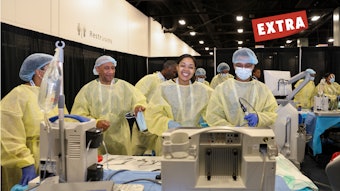A Year of OTO-HNS Journal Podcasts
A recap of the 2024 podcast series of the AAO-HNSF flagship journal Otolaryngology–Head and Neck Surgery (OTO-HNS) hosted by editor-in-chief Cecelia E. Schmalbach, MD, MSc.

 Cecelia E. Schmalbach, MD, MSc
Cecelia E. Schmalbach, MD, MSc
Etiology of Childhood Profound Sensorineural Hearing Loss: The Role of Hearing Loss Gene Panel Testing
Editor in Chief Cecelia E. Schmalbach, MD, MSc, is joined by author Rohani Omar MRCP, MD(Res) and Associate Editor John P. Dahl, MD, PhD, MBA, to discuss causes, especially genetic causes, of pediatric hearing loss as outlined in the paper “Etiology of Childhood Profound Sensorineural Hearing Loss: The Role of Hearing Loss Gene Panel Testing,” which published in the November 2024 issue of Otolaryngology–Head and Neck Surgery. They discuss the paper's investigation of gene panel testing for hearing loss in children.
Improving Operating Room Efficiency in Otolaryngology–Head and Neck Surgery: A Scoping Review
Editor in Chief Cecelia E. Schmalbach, MD, MSc, is joined by senior author Julie E. Strychowsky MD, MAS, FRCSC, and Associate Editor Michael J. Brenner, MD, to discuss methods for improving the efficiency of ORs for surgeons as outlined in the paper “Improving Operating Room Efficiency in Otolaryngology–Head and Neck Surgery: A Scoping Review,” which published in the October 2024 issue of Otolaryngology–Head and Neck Surgery. They discuss the importance of finding ways to save time and cost for operating rooms in order to serve more patients and reduce physician burnout.
When It's Not Allergic Rhinitis: Clinical Signs to Raise a Patient's Suspicion for Chronic Rhinosinusitis
Editor in Chief Cecelia E. Schmalbach, MD, MSc, is joined by author Ahmad R. Sedaghat MD, PhD, and Associate Editor Dana L. Crosby, MD, MPH, to discuss the possibility of chronic rhinosinusitis when allergies are assumed as outlined in the paper “When It's Not Allergic Rhinitis: Clinical Signs to Raise a Patient’s Suspicion for Chronic Rhinosinusitis.”
ctDNA as an Adjunct to Posttreatment PET for Head and Neck Cancer Recurrence Risk Assessment
Editor in Chief Cecelia E. Schmalbach, MD, MSc, is joined by author John Pang, MD, and Associate Editor Tristan Tham, MD, to discuss circulating tumor DNA (ctDNA) detection as a new technique to identify minimal residual disease in patients with solid tumors as outlined in the paper “ctDNA as an Adjunct to Posttreatment PET for Head and Neck Cancer Recurrence Risk Assessment,” which published in the August 2024 issue of Otolaryngology–Head and Neck Surgery. They compare ctDNA to the traditional PET to assess the best methods.
Long-Term Quality of Life After Thyroidectomy: Transoral Endoscopic Thyroidectomy Vestibular Approach Versus Transcervical Approach
Editor in Chief Cecelia E. Schmalbach, MD, MSc, is joined by senior author Jonathon O. Russell MD, and Associate Editor Raymond Liu Chai, MD, to discuss the pros and cons of two approaches to thyroidectomy as outlined in the paper “Long-Term Quality of Life After Thyroidectomy: Transoral Endoscopic Thyroidectomy Vestibular Approach Versus Transcervical Approach,” which published in the July 2024 special issue of Otolaryngology–Head and Neck Surgery. They compare the quality of life for patients under two methods including scarring and self-consciousness.
The Use of Deep Learning Software in the Detection of Voice Disorders: A Systematic Review
Editor in Chief Cecelia E. Schmalbach, MD, MSc, is joined by senior author Diana N. Kirke, MD, MPhil, and Associate Editor Lee M. Akst, MD, to discuss the potential for deep learning models to detect voice disorders as outlined in the paper “The Use of Deep Learning Software in the Detection of Voice Disorders: A Systematic Review,” which published in the June 2024 special issue of Otolaryngology–Head and Neck Surgery. They compare the accuracy of different models and inputs and ponder the possibility of real-world implementation.
Clinical Practice Guideline: Age-Related Hearing Loss, Part 1
Editor in Chief Cecelia E. Schmalbach, MD, MSc, is joined by lead authors Betty S. Tsai Do, MD, and Matthew L. Bush MD, PhD, MBA, for a discussion of some key points of the “Clinical Practice Guideline: Age-Related Hearing Loss,” which published in the May 2024 issue of Otolaryngology–Head and Neck Surgery. They discuss the recommendations for screening of hearing loss and the pros and cons for different treatment options of age-related hearing loss.
Clinical Practice Guideline: Age-Related Hearing Loss, Part 2
Editor in Chief Cecelia E. Schmalbach, MD, MSc, is joined by lead authors Heather M. Weinreich, MD, MPH and Carrie L. Nieman, MD, MPH, to provide a patient and primary care provider-focused overview of the “Clinical Practice Guideline: Age-Related Hearing Loss,” which published in the May 2024 issue of Otolaryngology–Head and Neck Surgery. They discuss the pearls and pitfalls in screening and treating hearing loss for the patient and non-otolaryngologist providers.
Otolaryngology Applicant Perspectives on In-Person and Virtual Residency Interviews
Editor in Chief Cecelia E. Schmalbach, MD, MSc, is joined by senior author Anne C. Kane, MD, and Associate Editor Michael J. Brenner, MD, for a discussion of the article “Otolaryngology Applicant Perspectives on In-person and Virtual Residency Interviews," which published in the April 2024 issue of Otolaryngology–Head and Neck Surgery. They discuss the pros and cons of conducting residency interviews either in-person or virtually, including the impacts of in-person interviews on underrepresented applicants.
Clinical Practice Guideline: Immunotherapy for Inhalant Allergy, Part 1
Editor in Chief Cecelia E. Schmalbach, MD, MSc, is joined by lead author Richard K. Gurgel, MD, MSC, and author Stacey L. Ishman, MD, MPH, for a discussion of the implications for otolaryngologists of the “Clinical Practice Guideline on Immunotherapy for Inhalant Allergy,” which published in the March 2024 issue of Otolaryngology–Head and Neck Surgery. They discuss how the CPG came together over two years and what they discovered, comparing different types of immunotherapy and the effects on different patient populations.
Clinical Practice Guideline: Immunotherapy for Inhalant Allergy, Part 2
Editor in Chief Cecelia E. Schmalbach, MD, MSc, is joined by author Cecelia C Damask, DO, and author Christine M. Reger, DNP, CRNP, for a discussion of the implications for non-otolaryngologists of the “Clinical Practice Guideline on Immunotherapy for Inhalant Allergy,” which published in the March 2024 issue of Otolaryngology–Head and Neck Surgery. They discuss how allergies impact patients' lives and how immunotherapy can improve their symptoms.
Reducing Pediatric Posttonsillectomy Opioid Prescribing: A Quality Improvement Initiative
Editor in Chief Cecelia E. Schmalbach, MD, MSc, is joined by Associate Editor Michael J. Brenner, MD, and Associate Editor and senior author John P. Dahl, MD, PhD, MBA, for a discussion of the article “Reducing Pediatric Posttonsillectomy Opioid Prescribing: A Quality Improvement Initiative,” which published in the February 2024 issue of Otolaryngology–Head and Neck Surgery. They discuss how the researchers were able to reduce the numbers of opioid doses given to pediatric patients after adenotonsillectomy through standardized processes for prescribing.
Identifying Predictors of Treatment Response in Ménière's Disease: A Clinical Severity Staging System
Editor in Chief Cecelia E. Schmalbach, MD, MSc, is joined by Associate Editor Jacob Hunter, MD, and senior author Jay F. Piccirillo, MD, for a discussion of the article “Identifying Predictors of Treatment Response in Ménière's Disease: A Clinical Severity Staging System,” which published in the January 2024 issue of Otolaryngology–Head and Neck Surgery. Their conversation highlights how decreased vertigo severity, reduced comorbidity burden, and absence of hearing loss are associated with conservative treatment response in Ménière's disease.




















